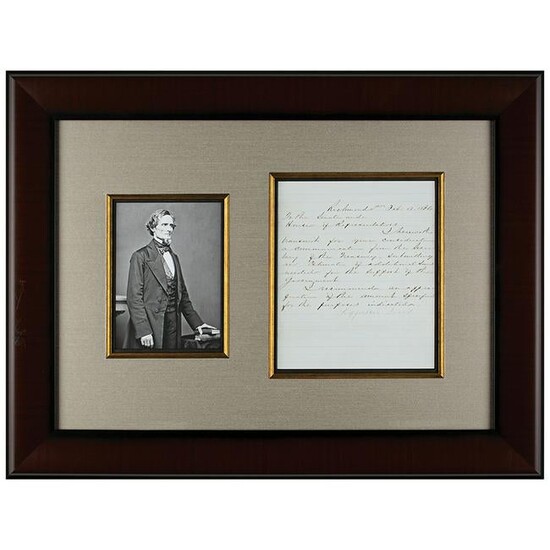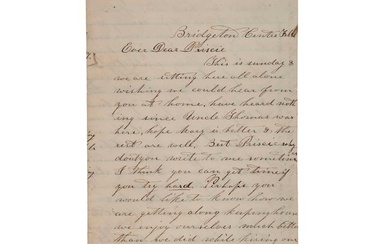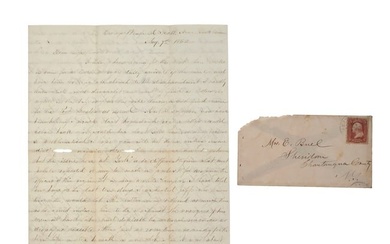Jefferson Davis Letter Signed
Civil War"“dated LS, signed "Jefferson Davis," one page, 7.5 x 9, February 12, 1864. Letter sent from Richmond to the "Senate and House of Representatives" of the Confederate States of America, in full: "I herewith transmit for your consideration a communication from the Secretary of the Treasury, submitting our Estimate of additional sums needed for the support of the Government. I recommend an appropriation of the amount specified for the purposes indicated." Handsomely double-matted and framed with a portrait to an overall size of 25.75 x 19.5. In fine condition, with some light creasing.
Unlike the North, which had an economy bolstered by commercial and manufacturing interests, the rural South's wealth was largely concentrated in agrarian land and slaves. As efforts to raise revenue through taxation were ineffective, Jefferson Davis's administration turned to loans and the sale of bonds to finance the war effort. By the spring of 1863, crushing inflation motivated Richmond to enact comprehensive legislation that included a progressive income tax, levies on certain goods, excise and license duties, and a ten-percent tax on agricultural products (to be paid with those crops, rather than the CSA's own depreciating cash). Although these policies kept the Confederacy's armies from starving, the government's financial situation remained dire. In early 1864, the Confederate Treasury Department submitted an urgent report to President Davis, outlining the funds necessary to continue running the government”everything from the War Department to the Post Office”for the first half of the year, amounting to over $3.6 million.
With this letter, Davis placed the report before the Confederate Congress. The Journal of the Congress of the Confederate States of America records this letter, and the fact that action on it began the same day. On February 17th, Congress passed an omnibus package related to taxes, currency, and loans, on top of a new conscription bill. The financial acts authorized unlimited borrowing and mandated the exchange of Treasury notes for bonds, in a last ditch effort to curtail inflation. By the time these policies were implemented in April 1864, General U. S. Grant was readying his Overland Campaign, and within a year he would capture Richmond. With Lee's surrender at Appomattox, the Confederacy's notes and bonds were rendered all but worthless.
View it on
Estimate
Time, Location
Auction House
Civil War"“dated LS, signed "Jefferson Davis," one page, 7.5 x 9, February 12, 1864. Letter sent from Richmond to the "Senate and House of Representatives" of the Confederate States of America, in full: "I herewith transmit for your consideration a communication from the Secretary of the Treasury, submitting our Estimate of additional sums needed for the support of the Government. I recommend an appropriation of the amount specified for the purposes indicated." Handsomely double-matted and framed with a portrait to an overall size of 25.75 x 19.5. In fine condition, with some light creasing.
Unlike the North, which had an economy bolstered by commercial and manufacturing interests, the rural South's wealth was largely concentrated in agrarian land and slaves. As efforts to raise revenue through taxation were ineffective, Jefferson Davis's administration turned to loans and the sale of bonds to finance the war effort. By the spring of 1863, crushing inflation motivated Richmond to enact comprehensive legislation that included a progressive income tax, levies on certain goods, excise and license duties, and a ten-percent tax on agricultural products (to be paid with those crops, rather than the CSA's own depreciating cash). Although these policies kept the Confederacy's armies from starving, the government's financial situation remained dire. In early 1864, the Confederate Treasury Department submitted an urgent report to President Davis, outlining the funds necessary to continue running the government”everything from the War Department to the Post Office”for the first half of the year, amounting to over $3.6 million.
With this letter, Davis placed the report before the Confederate Congress. The Journal of the Congress of the Confederate States of America records this letter, and the fact that action on it began the same day. On February 17th, Congress passed an omnibus package related to taxes, currency, and loans, on top of a new conscription bill. The financial acts authorized unlimited borrowing and mandated the exchange of Treasury notes for bonds, in a last ditch effort to curtail inflation. By the time these policies were implemented in April 1864, General U. S. Grant was readying his Overland Campaign, and within a year he would capture Richmond. With Lee's surrender at Appomattox, the Confederacy's notes and bonds were rendered all but worthless.





